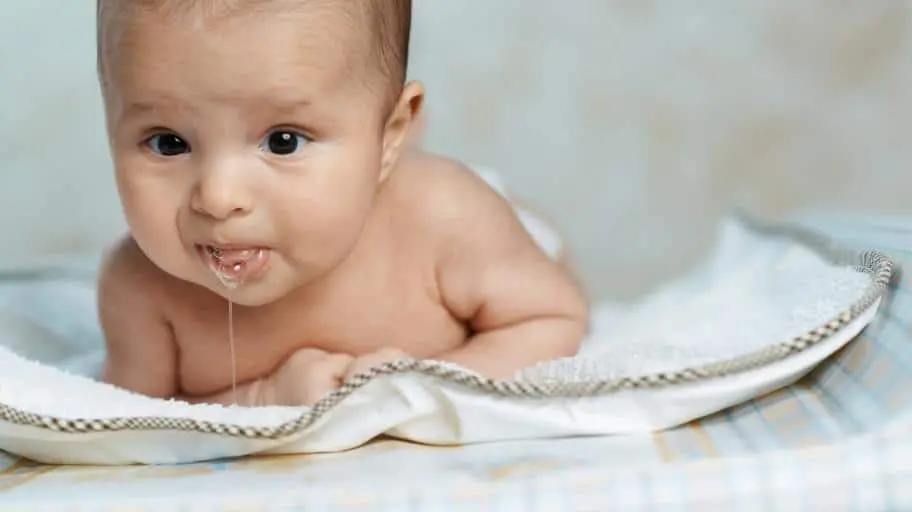The shedding of a small baby is a fact in the life of new parents: it happens quite often and there are even special wipes dedicated to its cleaning. But when your child seems to be spitting all the time, it’s understandable if you’re wondering if that’s normal. Fortunately, experts say, most of the time you don’t have to worry about baby leagues.
How often or how often a baby spits varies from baby to baby, says Dr. Jeffrey Bourne, a pediatrician at a health center in Santa Monica, California. In general, he says, spitting in babies is “very, very common and generally not alarming.”
Whether your baby tends to spit or you just want to be prepared for what to expect in the first few months, here’s what you need to know:
Why do babies spit?
To understand why babies spit, it’s worth knowing what spitting is. Spitting is different from vomiting. Vomiting is the forcible elimination of something from the body, while spitting is usually a “gentle regurgitation,” says Dr. Ashanti Woods, a pediatrician in Baltimore. In addition, the baby’s spitting is usually in small amounts, while vomiting has a larger volume.
There are several reasons why babies may spit:
? There is reflux. Babies often spit due to gastroesophageal reflux, a condition in which swallowed things come back from the stomach and come out of the mouth and nose, Woods explains. A valve in the lower esophagus usually prevents this, but it still doesn’t work very well in newborns. So the food goes back up, Bourne says. As this mechanism matures, babies are prone to frequent spitting.
? He drank too much milk. If the newborn weighs about 3 kilograms, the stomach has a capacity of about 100 ml. “If you feed the baby 120 ml of milk at one feeding, there is a high probability that the baby will spit out,” says Dr. Bourne.
? He doesn’t like formula. If your baby is fed formula, it may be intolerable to the type you are using, says Dr. Woods. If you suspect that this is the reason for the baby’s spitting, talk to your pediatrician about changing the brand of milk.
? Something in your diet does not tolerate him. If you are breastfeeding, it is possible that something you are taking, such as too much caffeine, will increase the amount of spitting out, says Dr. Woods. But first talk to your baby’s pediatrician before giving up anything on your diet, especially since there are so many other reasons why your baby may spit.
When do babies stop spitting?
Babies don’t spit forever – something worth remembering if you feel like all your clothes are spit in the laundry basket. Although every baby is different, Dr. Bourne says most babies stop spitting by six months: “It usually gets smaller and smaller over time,” he says.
The baby spits a lot: how normal is it?
Baby spit should usually be a few tablespoons or less than 25 ml, says Dr. Woods. If your baby spits more than that or spits after each feeding, tell your pediatrician. There’s probably nothing to worry about – some babies just spit more often than others. “If your baby is still gaining weight, it’s usually not a cause for concern,” says Dr. Bourne.
When is the baby’s spitting annoying?
If the baby is lethargic, does not gain weight or has blood in the sputum, call your pediatrician. If you have a greenish tinge, you should also consult your doctor, as in rare cases it may signal a blockage of the baby’s gastrointestinal system. If the baby spits and seems worried about it, it is also worth calling a doctor – the acid in the spit can cause discomfort.
Reduce the baby’s spitting
If your baby spits a lot, you may need to do a little detective work to see what causes it. Here are some methods that can help you and give some relief to your baby:
? Hold the baby face down at an angle of 30 to 45 degrees after feeding. “This is often the position you would hold a baby to belch,” says Dr. Bourne. Keeping your baby on your shoulder in this position for 15 to 20 minutes after feeding should help reduce spitting.
? Try to feed the baby less at once. If it looks hungry, you can compensate by feeding it more often, says Dr. Woods.
? Consider changing formula. It is possible that another brand will have a better effect on the baby.
If these methods do not work or you are still worried about your baby spitting, talk to your pediatrician about the next steps. But usually you don’t have to worry. “Most babies will do well without having to change,” says Dr. Woods, “you may just have to wait for him to go through this period.”







